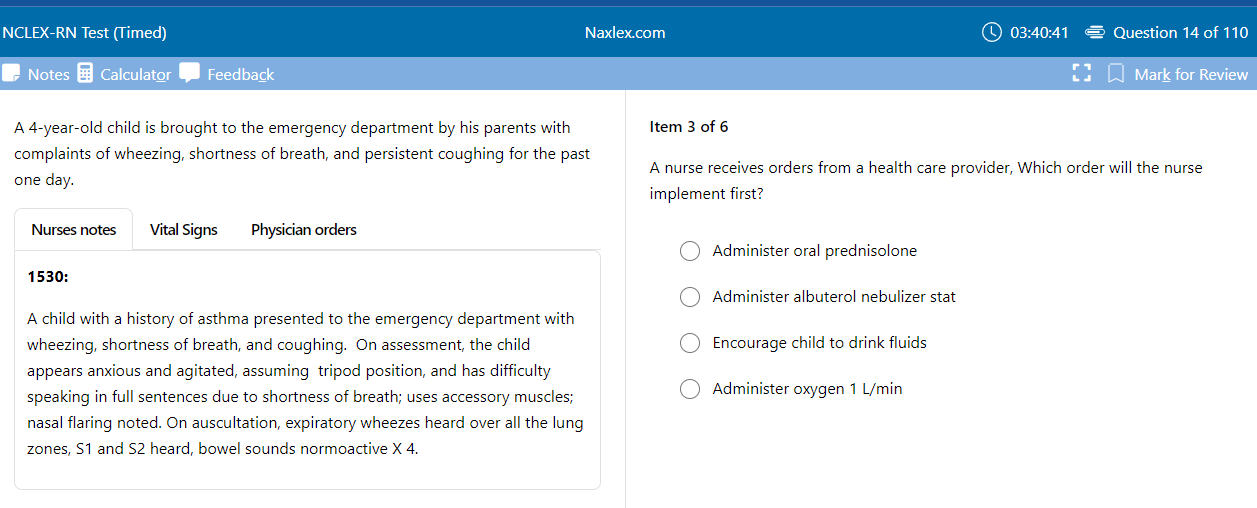Do LPN and RN take the same NCLEX? This is a popular question for thousands of aspiring nursing nurses. However, LPNs and RNs do not take the same exam. Licensed Practical Nurses (LPNs) and Registered Nurses (RNs) face slightly different exams: the NCLEX-PN for practical nurses and the NCLEX-RN for registered nurses. Knowing the differences between these two exams is essential for nursing students and professionals planning their career paths.
Whether you take NCLEX as an LPN or RN, efficient preparation is critical for your nursing career ambitions. The majority of candidates face the exam unprepared and thus end up failing in their first attempt. But passing NCLEX-PN and NCLEX-RN is possible if you use one of the best test prep tools, the Naxlex. Our award-winning NCLEX test preparation guides guarantee you an A or 100% money back. Sign up and experience Naxlex premium packages for your success.
Naxlex NCLEX-RN is now live!
➕ 10+ Tutored CATs
➕ 5+ Readiness Exams
➕ Comprehensive reports
➕ 14-Day Free Trial until 30th November
The basics of LPN and RN to take the NCLEX
The NCLEX offers two options depending on the type of nursing license a candidate is seeking. The available options include;
- NCLEX-RN: The NCLEX-RN is for candidates who want to become Registered Nurses. This exam evaluates a broader range of competencies, such as higher-level thinking and leadership skills. Candidates taking this exam must have completed either an Associate Degree in Nursing (ADN) or a Bachelor of Science in Nursing (BSN) program.
- NCLEX-PN: The NCLEX-PN is taken by individuals who are pursuing a license as a Licensed Practical Nurse (LPN) or Licensed Vocational Nurse (LVN), depending on the state. The focus of this exam is on entry-level practical nursing skills, and candidates usually complete a diploma or certificate program in practical nursing.
Differences between LPNs and RN to take same NCLEX
While both versions of the NCLEX serve similar goals, several key differences between the NCLEX-RN and NCLEX-PN reflect the distinct responsibilities of RNs and LPNs in the healthcare system.
1. Scope of exam
One of the most significant differences between the NCLEX-RN and NCLEX-PN is the scope of practice that each exam covers.
NCLEX-RN: Registered Nurses are expected to manage patient care more independently, often supervising LPNs and other healthcare personnel. The exam RN evaluates advanced decision-making, leadership in patient care, and the ability to manage multiple clients and complex cases. For instance, RNs are often tasked with creating and assessing care plans, delegating tasks, and taking on more responsibilities in the administration of treatments and medications.
NCLEX-PN: LPNs typically work under the supervision of an RN or physician. Therefore, the NCLEX-PN focuses more on basic nursing skills and assisting in the implementation of care plans, rather than treating them. LPNs also handle daily patient care activities such as monitoring vital signs, administering medications, and assisting with activities of daily living (ADLs).
2. Exam content and structure
While LPNs and RN use computer-adaptive testing (CAT), which adjusts the difficulty of questions based on the candidate’s performance, the types of questions on each exam vary in terms of complexity and focus.
Number of Questions: Both the NCLEX-RN and NCLEX-PN consist of a minimum of 75 questions and a maximum of 145 questions, depending on how the test adapts to the candidate’s responses. However, the content areas tested are different for each exam.
Content Distribution: The NCLEX-RN includes more questions related to advanced care management, pharmacological therapies, and the evaluation of nursing interventions. RNs are often asked about coordinating complex care for multiple patients, whereas the NCLEX-PN focuses more on practical tasks such as patient hygiene, basic assessments, and safe medication administration.
The distribution of content areas also reflects these differences. For example, the NCLEX-RN places more emphasis on patient management and safety protocols, while the NCLEX-PN may focus more on supportive care and assisting RNs in these areas.
3. Responsibilities reflected in the exam
The NCLEX-RN tends to be more challenging due to the greater responsibilities that come with being an RN. RNs are expected to perform more complex nursing tasks and to think critically about patient care. As a result, the NCLEX-RN asks more in-depth questions about care planning, patient safety, and the administration of higher-risk treatments like intravenous medications and blood transfusions.
In contrast, the NCLEX-PN reflects the LPN’s role in assisting with patient care. While LPNs provide essential care and perform many of the same tasks as RNs, they do so under supervision, which means they are not responsible for creating care plans or making high-level decisions about patient care. The questions on the NCLEX-PN reflect this more supportive role. Based on the roles of each nurse, the LPN exam is deemed easier than the RN because the demands are also low.
4. Exam complexity and difficulty
Due to the difference in responsibilities between RNs and LPNs, the NCLEX-RN is generally considered more challenging. It not only covers a broader range of topics, but the questions require more advanced critical thinking skills. The NCLEX-PN, while still a rigorous test, focuses more on practical nursing skills, making it slightly less demanding in terms of complexity.
The LPN and RN NCLEX exams depict some key differences, such as the scope of the exam, its content and structure, the responsibilities reflected in it, and its complexity and difficulty. These differences are reciprocated in the NCLEX taken by the LPNs and RNs. So, LPNs and RNs do not take the same NCLEX since their job responsibilities are slightly different.
Conclusion
While both the NCLEX-RN and NCLEX-PN are essential for ensuring safe nursing practices, they are distinct in terms of content and difficulty. Each exam reflects the specific responsibilities and scope of practice for RNs and LPNs, and both play a crucial role in preparing nurses to provide quality care. So, if you still wonder “Do LPN and RN take the same NCLEX?” The answer is No. Licensed Practical Nurses (LPNs) and Registered Nurses (RNs) face slightly different exams. By understanding the differences between the two exams and preparing accordingly, candidates can approach their tests with confidence and success. Sign up for LPN and RN success.


